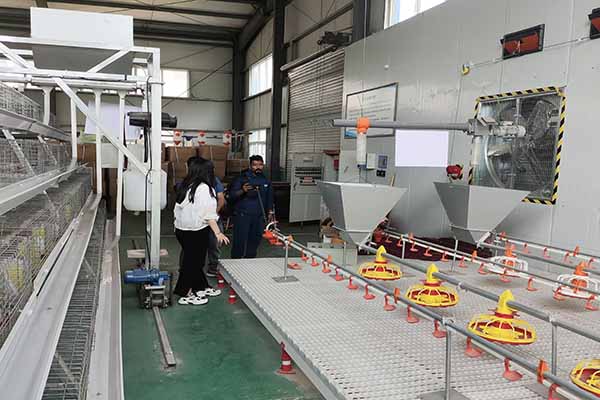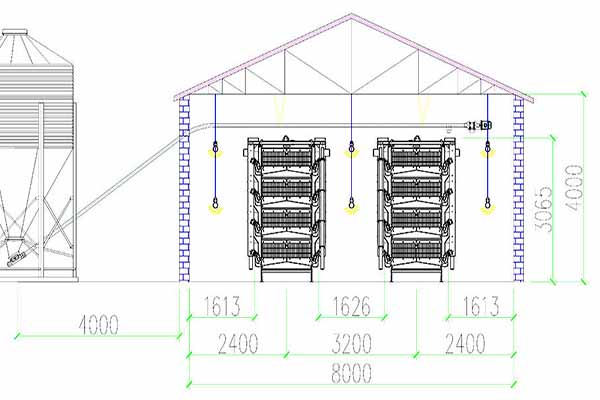How to Establish a Profitable Chicken Farm: A Comprehensive Guide
Time : 2025-07-03
Starting a profitable chicken farm requires a well-thought-out plan, sound knowledge of the industry, and the right equipment. In this comprehensive guide, we’ll explore the essential steps to establish a successful chicken farm that can generate significant profits.
Understanding the Market
Before diving into the operational aspects, it’s crucial to understand the market you’re targeting. This includes identifying your niche, understanding consumer preferences, and knowing the local competition.
Conduct market research to determine the demand for different types of chickens, such as broilers, laying hens, and heritage breeds. Additionally, consider the local regulations and certifications required for selling your products.

Choosing the Right Location
The location of your chicken farm plays a vital role in its success. Here are some key factors to consider:
- Climate: Choose a location with a climate that is suitable for the type of chickens you plan to raise. For example, broilers require a climate-controlled environment, while laying hens can tolerate a wider range of temperatures.
- Accessibility: Ensure that your farm is easily accessible to suppliers and customers. Proximity to markets can significantly reduce transportation costs and improve product freshness.
- Water and Power Supply: Access to a reliable water and power supply is essential for the operation of your farm. Plan for the necessary infrastructure to ensure continuous operation.
- Regulations: Check local regulations regarding zoning, animal welfare, and environmental impact. Adhering to these regulations will help avoid legal issues and maintain the reputation of your farm.
Developing a Busine ss Plan
ss Plan
A solid business plan is essential for securing funding and guiding your operations. Here are the key components:
- Executive Summary: A brief overview of your business, its mission, and the goals you aim to achieve.
- Company Description: Details about your farm, including the type of chickens you plan to raise, the farming methods you’ll use, and your target market.
- Market Analysis: Information about the market you’re entering, including your competition and market trends.
- Organization and Management: A description of your farm’s organizational structure and the skills of your team members.
- Service or Product Line: An in-depth look at the types of chickens you’ll be raising and the services you’ll offer.
- Marketing and Sales Strategy: A plan for promoting your farm and selling your products.
- Financial Projections: Forecasting your farm’s income, expenses, and cash flow over the next few years.
Building the Infrastructure
The infrastructure of your chicken farm will include the following key components:
- Chicken Coops: Design and build chicken coops that provide adequate space, protection from predators, and comfortable living conditions. Ensure proper ventilation and insulation to maintain an optimal environment for your chickens.
- Feeding System: Invest in an efficient feeding system that minimizes waste and ensures that your chickens receive the right nutrition. Automated feeders can save time and reduce the risk of overfeeding or underfeeding.
- Watering System: Implement a reliable watering system that provides fresh water to your chickens at all times. Waterers should be easy to clean and maintain to prevent the spread of disease.
- Manure Management: Develop a system for managing chicken manure effectively. Proper disposal or reuse of manure can improve soil health and reduce environmental impact.
- Equipment: Invest in high-quality, durable equipment such as incubators, hatchers, and egg sorting machines. These tools will streamline your operations and improve efficiency.
Managing Health and Welfare
The health and welfare of your chickens are critical to the success of your farm. Consider the following:
- Regular Vet Checks: Schedule regular veterinary check-ups to monitor the health of your flock and prevent the spread of diseases.
- Biosecurity Measures: Implement biosecurity measures to prevent the introduction and spread of pathogens. This includes controlling access to the farm, practicing good hygiene, and quarantining new birds.
- Diet and Nutrition: Provide a balanced diet that meets the nutritional needs of your chickens. Consider factors such as age, sex, and production phase when formulating their diet.
- Comfortable Living Conditions: Ensure that your chickens have comfortable living conditions, including adequate space, proper ventilation, and protection from extreme weather conditions.
Marketing and Sales
Marketing and sales are crucial for generating profits. Here are some strategies to consider:
- Direct Sales: Establish direct relationships with customers by selling at local farmers’ markets, farm gates, or through a community-supported agriculture (CSA) program.
- Wholesale Sales: Explore opportunities to sell to local restaurants, grocery stores, and other businesses. Building strong relationships with buyers can provide a stable income source.
- Online Presence: Create a website and social media profiles to market your farm and connect with customers. Use online platforms to showcase your products and share news about your farm.
- Branding: Develop a strong brand identity that resonates with your target market. A distinctive brand can make your farm stand out and build customer loyalty.
Conclusion
Establishing a profitable chicken farm requires careful planning, a thorough understanding of the industry, and the right equipment. By following this guide and staying focused on your goals, you can create a successful farm that generates significant profits.












